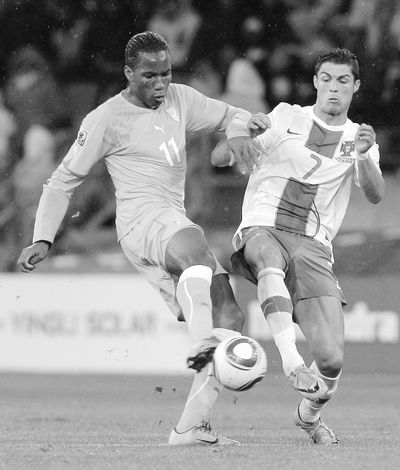Skulduggery!
The ‘art’ of diving has come under fire at World Cup

JOHANNESBURG – By now, if you’ve been watching the World Cup, you’ve surely seen it. A player dribbles skillfully toward the box, an opposing defender barely clips his cleat as he goes for the ball, the player goes tumbling down, rolls three times, grabs his ankle (sometimes the wrong ankle), writhes in pain, looks toward the referee and raises his arms dramatically, as if to say: “Hey, Mr. Ref, did you see THAT?”
The ref pauses, and gives the player a free kick. The defender rolls his eyes, shakes his head and mumbles a few choice words.
“Diving” – the art of faking a fall – has been part of soccer for decades.
Francis “Franny” Lee, an English star of the 1960s and ’70s was notorious for falling down easily. Diego Maradona did his share of Greg Louganis impressions. So did Germany’s Jurgen Klinsmann.
These days, Cristiano Ronaldo of Portugal and Didier Drogba of the Ivory Coast are among the star players who have perfected the subtle art of tumbling and feigning injury.
“A player the likes of Cristiano Ronaldo, following the faintest of touches, will go down like he was shot,” said former Miami Fusion coach Ray Hudson.
“It’s pathetic and nauseating for the regular fan to see. There are times it is clearly cheating, skulduggery, and FIFA should come down hard retroactively. If no contact was made, a five-game ban.
“We ought to root out these diving swans.”
U.S. defender Jay DeMerit has watched countless referees fooled by cunning forwards who put themselves in the perfect position to be nicked by a defender, and then turn into Hollywood-worthy stunt men. In soccer they award the Golden Boot and the Golden Ball trophies. Maybe a Golden Globe is in order.
“As a defender, and an aggressive defender who likes to go into tackles hard and to win balls physically but fair, sometimes I’m on the end of somebody that jumps well before I get to the ball, but then I get called for a foul because of the way I play,” he said. “That doesn’t make me feel too happy. I understand it’s part of the game, but I don’t like it.”
Some soccer experts disagree.
“I am well-known for defending the dive,” said ESPN analyst Alexi Lalas, a former U.S. World Cup defender. “I certainly took dives when I played if I felt I could use it to my advantage at appropriate moments.
“I can respect it as a skill certain players have of getting the right position to gain an advantage. I don’t think it brings disrespect to the game.”
Lalas explained that if the attacking player is even slightly touched by a defender, especially in the penalty area, it could throw him off balance and disrupt what would have been a clean shot at the goal.
Rather than try to fight through the defender, it is wiser to go down and hope for a free kick or a penalty kick.
‘Any advantage’
Eric Eichmann of Boca Raton, Fla., a forward on the 1990 U.S. World Cup team, agrees with Lalas.
“As an attacking player, I want to get any advantage I can get. I’ll take a dive if I have to.”
At the 1998 World Cup, Diego Simeone’s theatrics led to the expulsion of English star David Beckham in a Round of 16 match between England and Argentina. Simeone, touched by Beckham’s heel in retaliation after a foul, hurled himself to the ground as if he had taken a right jab from Mike Tyson.
“Simeone went down as if he’d been shot,” Beckham said at the time. “My first thought was, ‘I’ve made a big mistake here.’”
Four years later, soccer’s governing body said it planned to clamp down on “simulation,” their polite word for diving. But not much really changed.
A worldly move
It has been suggested over the years that Latin players dive more than non-Latins, but there are plenty of examples of divers from all over the world to refute that theory.
Fernando Clavijo, a defender on the 1994 U.S. World Cup team, has a bitter memory of a World Cup dive. The U.S. was playing against Brazil, and Romario came toward Clavijo.
“I came across him, he dove and that was it,” Clavijo recalled. “I didn’t foul him, but I got called for my second yellow card, and that was my last World Cup moment. No goal was scored because of it, but I was out of the game. And that was the last game of my life. I retired after that World Cup, and my final memory is being thrown out because Romario dove.
“What can you do? You feel helpless.”